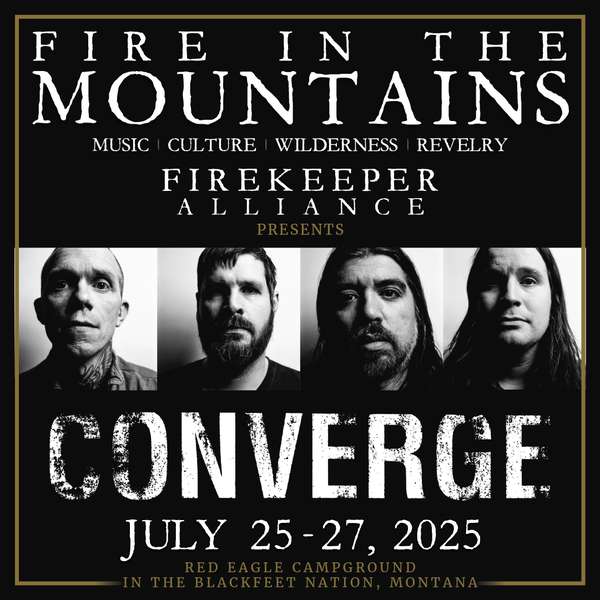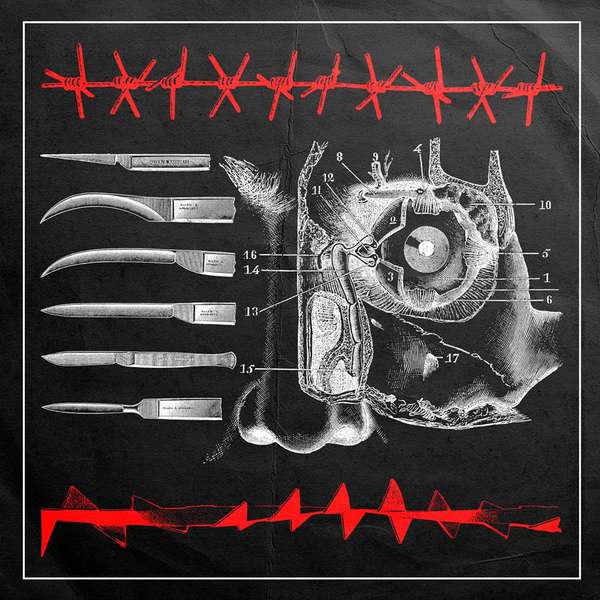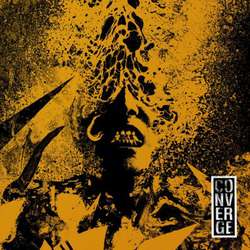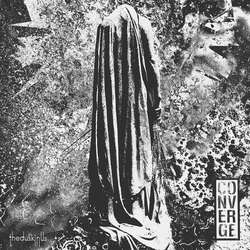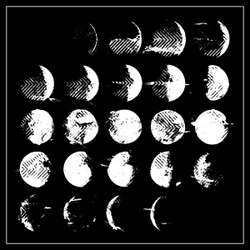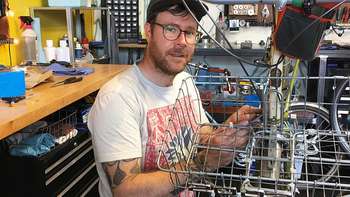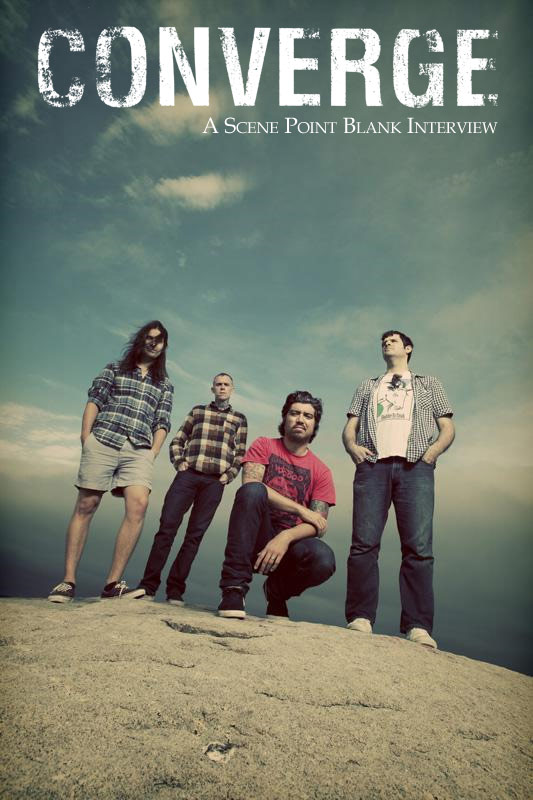
When Converge released Axe to Fall it quickly became a front-runner for album of the year. The long-running hardcore band once again found new ways to impress and surprise even the most open-minded listeners with the music that comprised the album. Scene Point Blank spoke at length with vocalist Jacob Bannon about all things Converge, his various side-projects, and Deathwish Inc. happenings.
Scene Point Blank: Tomorrow is the release date for Axe to Fall. It's been nearly twenty years of playing and releasing music for Converge...
Jacob Bannon: About that, nineteen, twenty years. We like to think we started making relevant music fifteen years ago when we started to shed influences and be our own animal.
Scene Point Blank: What kinds of emotions are raised with the release of a new album?
Jacob Bannon: It's really no different. For us, we're still just a band of four guys that tour in a van and trailer and share music with people. The only thing that is different is that we are older and have more responsibly, more complex lives. The older you get, the more life experiences you have. Nothing else has really changed. Our goals have never been any weird commercial success. Our goals have just been to play music that we enjoy and share it with people. And we're still doing it.
Scene Point Blank: Given the fact that the band is a full-time venture, how do you keep it fresh?
Jacob Bannon: With this album, we brought in some collaborators to work with us, some outside people that we've known for years to work on songs with us and that was a way to keep things interesting and challenging. Some bands just start getting stale after a while and we just don't want to ever be that. We never want to release a sub par record. So to bring in people, that was a great experience. Doing some challenging tours every once in a while, as opposed to doing relatively safe tours with bands that we all wholly enjoy. We do those kinds of tours all the time, like the last time we were at the Grog Shop with Ceremony and Rise and Fall and Coliseum. This tour that we're on right now, High on Fire, we've been friends with them for a long time, and Mastodon, we've been friends with them for a while too. Dethklok are a whole new animal, but they're becoming friends as well. And we're playing for anywhere from two to five thousand fourteen to seventeen year olds that are first level listeners to aggressive heavy music. Their knowledge base of heavy music doesn't go past the Metallica's of the world, the more accessible commercial metal bands. So we are a very challenging thing to those kinds of people. It's challenging to be in an environment where you are judged before you even take the stage. Sometimes it's fun to put yourself out there and not be in safe positions.
Scene Point Blank: Speaking of collaborations, it was in another interview that you said that the collaboration with Cave In was sort of the catalyst for the new album.
Jacob Bannon: It was the first time we really started doing something like that. A bunch of years ago we all went into Kurt's studio together, starting writing music together, and recording at the same time the base of a bunch of songs. And we were going to release it, but our schedule got real busy and we really didn't feel that motivated to finish it at the time. And Cave In has this awesome character quality about them where they always want to move forward and do stuff so they just focused their energies elsewhere. And to make a long story short, it's going to stay dormant for a while. The seed was planted within us to pick up some of those songs and re-address them and to take that conceptual idea of bringing all these people form outside parties and try to make it happen.
Scene Point Blank: Is it something you might pick up and revisit?
Jacob Bannon: Well we've used all the songs. There were only two other songs, I believe, from the session that were half-finished that were songs that Steve wrote. I believe they could end up becoming Cave In songs; I would think that more than likely they would become Cave In songs at some point. Two of the songs ended up on this album and "Plagues" from No Heroes was the other song from the original session when we started writing with those guys. The songs took on a different character once we started working with other artists. The Cave In tracks are still there, but we brought in Genghis Tron to work on stuff. And Steve Von Till from Neurosis worked on a song with us. The songs at that point took on a whole other character that weren't just Cave In and Converge. So they became these different animals. It would have been nice to finish that project, but it is what it is. I don't really like to think about things that could have been. I think about this thing that we did create.
Scene Point Blank: That exciting and cool that you still used the songs in some manner.
Jacob Bannon: Exactly. They were great songs that we wanted to utilize. We'd always say, "We got to do something with these, something, anything." I'm just happy that a couple of those songs came out. But they still sound like Converge songs too. That's the thing, it's not like they're a huge departure.
Scene Point Blank: On the new album you worked with a lot of different musicians. What was it like working with musicians that you both have immense respect for as well as having been profoundly influenced by, like Steve Von Till and Uffe Cederlund of Entombed?
Jacob Bannon: It's awesome. I'm just really appreciative of the fact that they acknowledge our existence. To me, I'm just the sixteen-year-old kid playing in a band. So when those guys actually give a shit about what we're doing, it's very flattering. Steve's a very humble guy and we're all very glad to have him involved in the record. And Uffe, he quit Entombed a while ago but he's in Disfear, and we're really close with them.. But it was really natural working with him. He's a good guy and he wrote some of the greatest death metal songs of all time. For him to contribute, it's awesome.
Scene Point Blank: There has been an immense amount of praise to the album, especially to the last two tracks on the album. Given the experimental nature of these songs when compared to the bulk of the Converge catalog, how satisfying is it to have them appreciated in such a positive manner?
Jacob Bannon: We experiment on every record. Every release that we've done since 1998 or 1999 has had some sort of stylistic departure, some sort of instrumentation that isn't traditional band instrumentation in some way and this is an expansion on that idea. It's not like we're reinventing the wheel at all, we're just refining our experimental approach. Heavy music and aggressive music doesn't always have to be raging and thrashing. There needs to be a dynamic to give these things power. If you just race forward with a billion beats per minute, it's going to sound like white noise after a while. So it's nice to be able to allow an album to breath, to create an organic environment to it. Those kinds of songs are the way we've always done that. I don't think we'd ever want to come out with an album that is all that. We just like to have diversity in each record to show versatility.
Scene Point Blank: The leak of "Axe to Fall" was fairly publicized given that the source of the leak was pointed to a fairly large music publication. As a music journalist I often notice that albums leak to the Internet around the time that review copies begin to circulate.
Jacob Bannon: I can say, from a Deathwish perspective, the day that we send out any unprotected promos is literally the day that we start seeing the release leak. To me, there are pros and cons to leaks. I actually feel that it's fine for listeners to download and share it and preview it. And hopefully they'll be motivated to support our band or any band that they discover that way. There is nothing wrong with that. I find the issue more with the leaker themselves. What is it about? Why does someone feel that they have the privilege to take this release that was entrusted to them and give it to the world? That's not really the terms of how it works. And it makes your job for difficult. You're running a web-based hardcore and punk publication, and you want to be able to get releases early and preview them. And you're putting in all your own fucking free time and all you're making is maybe a small revenue from banner ads and some free records. Those people are in turn making your job harder by taking away your ability to get anything. And that's sad. We want to be able to give thanks and give people a little bit of a preview of a product that's not ready for the public yet. And it's sad when people overstep those boundaries. I would never want to demonize the listener, and I never want to demonize the leaker. But I question their motives. If someone is a fan of music, of our band for example, how do they justify wanting to share the music? At that point, we're not getting compensated for it, the label that fronted money for the thing to exist isn't... and mind you, we're a meager ass band. That's what we travel in. [Points to a van and a trailer.] We're not this frivolous rich band. People think that we're insanely wealthy. I live fucking paycheck-to-paycheck just like everyone else and I work really damn hard. Our band works damn hard and we just want to insure that releases are paid for, not by the listener, but that the expense is paid for. It's not free to record a record. That time isn't free to get all the stuff done. Mind you, we're a hands on band, so things are still pretty affordable for us to do things. But we do everything ourselves and make sacrifices. But the label still has to pay for manufacturing, they have to pay for promoting, they have to pay for their staff making it visible and available. Regardless of how flawed the aging dinosaur that is the music industry is, there is still a base of consumerism that drives it. And you still need to be able to participate in it a little bit. Or it just becomes complete chaos. And nobody wants that. They would say they want that if they were fourteen years old and living in their parents basement, but they wouldn't say that if they had something to lose.
Scene Point Blank: With Deathwish, the label offers a free digital copy of an album when it is pre-ordered. Do you feel helps individuals seek out ownership of the release?
Jacob Bannon: We've been doing download coupons for a long time. It's a similar system to what Sub Pop uses where if they purchase a physical copy we give them a digital version of the record. And why not? They purchased a copy. I don't want to limit someone to just having that. They can have it in that other flexible format; it's not doing any damage. The band is getting compensated. The label is getting compensated. And it helps everybody out. We have the technology to do direct downloads too. We just did the Rise and Fall album, for example, which doesn't come out until next Tuesday, but anyone that pre-ordered the record got a copy instantly. Basically, we just want to get people familiar with the band. They're a great band and it's a great record, and we'd rather get it out that way and take that risk and support the band than hold onto it and have the band tour the states and people not be familiar with it. You take a risk, but hopefully people enjoy the material and support them.
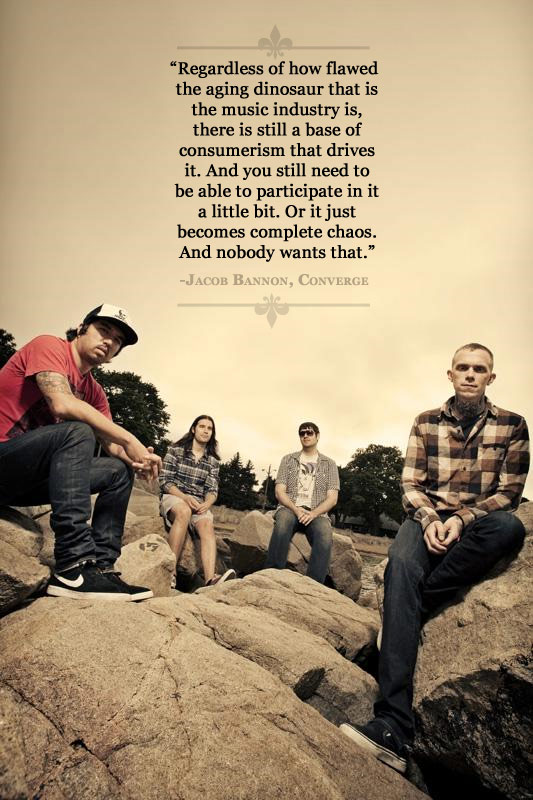
Scene Point Blank: Earlier in the year Converge took part in one of the Burning Fight book release shows in Chicago.
Jacob Bannon: Yep. We did three shows in Chicago that weekend actually. We did the two pre-shows; we played two shows on a Friday. An evening show and a late show. And then we did the Burning Fight on Sunday.
Scene Point Blank: What was it like playing on that show with bands that come and gone since Converge has been in existence?
Jacob Bannon: I had mixed feelings towards it to be honest. There are some bands and some people I really support in that world. Others, I don't. There are a few reasons for that. I should probably start off by saying that back then, in the mid 90's, we weren't a band that was accepted by that scene of people. We were always misfits, never really accepted by...I don't know how you would describe them, because they don't really exist now... scene kids that gave the stamp of approval if you were a band that should be supported. It had more to do about who you knew and who you were friends with as opposed to the quality of your music or the message that you were putting out there in some way. Honestly we didn't care and we still don't care. We just put our heads down and played our music. If people dug it, cool. If they didn't, that's all right too. It's interesting, because I had some great conversations there that weekend with people that actually understood that and remembered that rather than people that were over romanticizing that era. One of the guys that used to be in Groundwork from Arizona had a really great conversation with me that lasted a half hour or so just acknowledging that. And their place was essentially the same too. And we didn't know each other back then, but we kind of came from that same place of being misfits that didn't fit the hierarchy of hardcore at the time. So it was nice to see some people that had done some relevant things. But I also think it was too self-congratulatory in some ways as well. The book, I kind of flipped through. It's not exactly a comprehensive reflection on the community back then. It's one person's view of it, and that's fine, that's what books are. There is another book about that period coming out as well that I will think be a little more all encompassing.
Scene Point Blank: Deathwish has been a label for just under a decade. When you began the label, what was the most difficult obstacle you saw for operating an independent label? What do you see as the most difficult obstacle today?
Jacob Bannon: It's not that much different. Still poor as hell, still small as hell. Intentionally. Not intentionally poor, intentionally small. We do things the way we want to do them. We've released a whole lot of records. Some of them have been successful. Some of them haven't been, in financial terms. That's not really all that important to us. We just want to release great music from great bands. And we feel we're still doing that. When we started, it was at the peak of Napster and file-sharing taking off, so it's never really been a safe environment for a record label. It hasn't swayed us in any direction. The one thing about Tre, myself, and the people that are there is that we're kind of lifers in this community. We've been involved in it for a long time. We're used to the hard work and the true worth ethic that it takes to survive in it in some way. And we just do what needs to be done. We work twelve to sixteen hours a day. We literally break our backs for this place. We unload trucks. We take out garbage. We assemble records. We answer emails. We talk with bands. We buy bands planes tickets. We lose money. We sell records. We have all these great highs and exceptional lows running a label. That's most of the label experience in a nutshell. You get your heart broken by bands. Running a record label is almost like being in twenty-five dysfunctional relationships at once. There are some that are amazing experiences and there are others that you feel like you're fighting an uphill battle the entire time, but you do it for the love of the music and you do for the love of the bands and artists. I wouldn't trade that hard work for anything. It gives us a sense of purpose and a place to go. We employ some great people. It's just good.
Scene Point Blank: What is the status of Malfunction? Is it still a functional piece of the DW family or have those artists and releases been assumed into DW?
Jacob Bannon: We didn't' just buy Malfunction or anything. People think we're just some giant monopoly. It's so funny because we're not. Basically, our friends Tru and Linas ran Malfunction for many years. They're really close friends. We've worked with them in the art world and the music world, doing shows, whatever. They were getting tired and weren't in the place to give everything to the label anymore. And they asked for help. And we were really flattered that they came to us to take over the duties of Malfunction. They didn't want to just chop up the label and sell titles to other labels. They wanted someone to keep the label in tact the way they had it and fulfill the obligations to bands that were already committed to. We said all right, we helped them out. We paid off some things that they owed. Took over their stock and daily running of things. And I still talk to Tru almost every day.
Scene Point Blank: A couple have graduated up to Deathwish over the years?
Jacob Bannon: Our intentions weren't to hold onto anything. Our intention was just to fulfill what they already started. If there were records that they already had coming out - the Bitter End record was the first record that came out right in the throws of the label transition - we did it. The label was essentially done. So that was the first release that we did. And the rest of the records, we honored those deals. Reign Supreme, we were actually talking about working together prior to them working with Malfunction, so it was almost meant to be. Essentially, it's the same thing; we just put a different logo on it.
Scene Point Blank: Dear Lover was the original moniker for your solo material. You've since decided to use your surname. Will any of the material from the Dear Lover sessions appear on the upcoming full-length?
Jacob Bannon: I had a bunch of working names for it, mainly because I would talk to friends and say, "What do you think of this name?" I would continue recording and writing, I still do all the time. I recorded an album that's been done for like six months, I'm just kind of sitting on. I released one of the songs on a 7" it was recorded and not even intended for the album. I released that song and I released another song on a Deathwish sampler in May, and that song is one of the mixes from the album. The album is done; I just need to release it. One of the things with Deathwish, and myself, I never want Deathwish to be the Converge label and take pretty big steps to make sure that doesn't happen. That's one of the reasons why we never wanted to take on all the responsibilities of releasing Converge records. It's the same mindset that Aaron has with Isis and why Isis isn't cranking out Isis records on Hydra Head. To make a long story short, I put my shit on the backburner all the time. So, if something is coming out, "That Converge thing can wait and my record can wait. Let's get these records out so this band can go on tour and do whatever." We have the power to do that, because we run the asylum. I've moved it around the bunch and I was planning on releasing it around this time, but then this record came out and then the Doomriders album is coming out. There are countless projects and I didn't want to saturate the world. So I'll wait a few more months, it's not going to kill anybody.
Scene Point Blank: You've been working with Dwid Hellion and Stephen Kasner on Irons. Given the geographic distances between all of you, I'm interested in how the writing and recording of this project is handled.
Jacob Bannon: It's interesting and bizarre. It's almost a musical experiment. Dwid approached me about doing some work with him, like years ago, and we would talk about it occasionally. We have a lot of the same tastes in things outside of aggressive music world. He wanted to bring in Stephen. And that's great; he's a fantastic artist, a wonderful musician, and a visionary in many ways. Since we're scattered everywhere, Stephen is in California, Dwid is in Belgium, and I'm in Massachusetts, it would be impossible without the Internet. Basically, a song starts with one of us, we send it to the next guy, he adds his elements and he passes it along to the next and then it comes back to the maker of the song to be refined and mixed. We recorded a split 12" with Pulling Teeth that we are going to release. We were going to release it this past Spring, but the Pulling Teeth album was ready to be released, so we released that and put the split on the backburner. It's completely done and its mixed. It's just sitting on a hard drive right now.
Scene Point Blank: And the status of the Jane Doe vinyl repress?
Jacob Bannon: Well, it is an expensive project. We're doing something much more elaborate than the original version. The original version didn't have any insert of lyrics or anything like that. At the time, we couldn't pay for it. So we're doing a twenty-eight-page version of the original booklet so it will be a big 12"x12" booklet. Plus it is a double LP, so as opposed to manufacturing one record, you're doing two. You're not manufacturing 5000 records; you're manufacturing 10,000 records. So we're doing it in pieces. It's been a really busy time for Deathwish and we're small as hell. There is only so much money that we can throw out there in projects before we need money to come back in so we can pay for stuff. Basically we ran into a situation that we paid for so many recordings and so many projects, and so many bands were late or delayed in finishing their records that things piled up and became a traffic jam. It was a financial traffic jam and a release traffic jam. We've been responsibly getting all those records out there, making sure all those records have their time and visibility and the bands have records so they can go tour. And then the Converge stuff happens. We're also doing a 12" for Ben's band, Acid Tiger, as well as United Nations, which is doing a 7". There is a bunch of Converge things happening as well that we haven't' even technically announced. So it gets busy.
Scene Point Blank: At the beginning of the year, an individual was caught producing and selling fake prints, including a number of your prints. Just curious, as an artist, how you reacted to this?
Jacob Bannon: It's sad when that stuff happens. Its sad when I literally couldn't pay my mortgage that month, but there was a guy profiting off of not only my work but also my friends' works. It's a sad thing when you're struggling to do things in the most ethically and sound, clean way you can. But karma will get him one day. I won't have to.
Scene Point Blank: After your current tour, Converge heads to Japan for a few dates. What's on the agenda after that?
Jacob Bannon: Japanese tours are always really small, like a week. There is only so much you can cover. But it's Brutal Truth and us. We haven't seen those guys in a long long time. They reformed and put out a new record. It's a great opportunity. We're also hoping to do a Deathwish showcase over there soon. We have a couple of friends that run the Deathwish branch in Japan and they want to do some sort of tour, so we're working on that.
Scene Point Blank: And then there is the Maryland Deathfest.
Jacob Bannon: That's really the only other thing that was announced because they confirmed us so early. As for other touring, we'll definitely do a tour after this. We'll do a headlining tour and put together a really unique package some time next year and of course tour Europe as well.
Scene Point Blank: That's all I got. Thank you for your time.
Jacob Bannon: Thank you.
Words: Michael | Graphics: Matt
- Official Converge Website: http://convergecult.com
- Official Deathwish Inc. Website: http://www.deathwishinc.com





